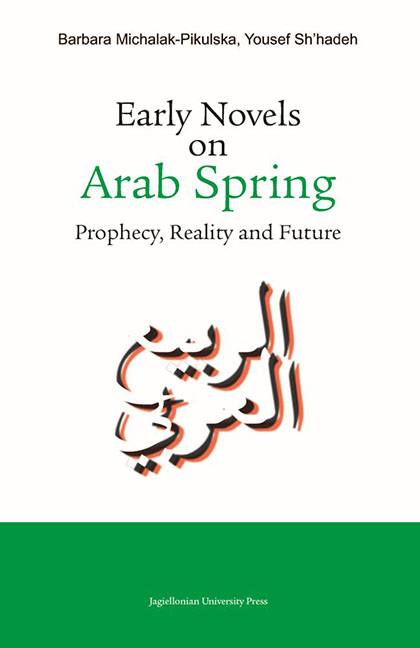Book contents
- Frontmatter
- Contents
- Introduction
- Part I Awakening of the Awareness of Subjugation – The Prophecy of the Spring of Nations in Arab Novels
- Part II At the Heart of the Arab Spring Events
- Part III The Future: The Spring Continues
- 17 Mu‘Taṣim Aš - Šā‘Ir : Uhzūǧat ar-raḥīl (A Song of Departure) and Fī intiẓār as-sulaḥfāt (Waiting for a Turtle)
- 18 Aḥmad ‘Abd Al - Malik : Al-Aqni‘a (Masks)
- 19 Ṭayba Aš - Šarīf Al - Idrīsī : Ḥaǧar min saqar (A Stone from Hell)
- 20 Amīra Aš - Širbīnī : ‘Itq (Liberation)
- 21 ‘ Izz Ad - Dīn Šukrī Fašīr : Bāb al-ẖurūǧ – risālat ‘Alī al-muf‘ama bi-bahǧa ġayr mutawaqqa‘a (The Gate to Leave – Ali’s Letter Filled with Unexpected Joy)
- Conclusion
- Bibliography
- Summary in Arabic
8 - Hišām ‘ Alwān : Dafātir qadīma (Old Notebooks)
Published online by Cambridge University Press: 13 October 2023
- Frontmatter
- Contents
- Introduction
- Part I Awakening of the Awareness of Subjugation – The Prophecy of the Spring of Nations in Arab Novels
- Part II At the Heart of the Arab Spring Events
- Part III The Future: The Spring Continues
- 17 Mu‘Taṣim Aš - Šā‘Ir : Uhzūǧat ar-raḥīl (A Song of Departure) and Fī intiẓār as-sulaḥfāt (Waiting for a Turtle)
- 18 Aḥmad ‘Abd Al - Malik : Al-Aqni‘a (Masks)
- 19 Ṭayba Aš - Šarīf Al - Idrīsī : Ḥaǧar min saqar (A Stone from Hell)
- 20 Amīra Aš - Širbīnī : ‘Itq (Liberation)
- 21 ‘ Izz Ad - Dīn Šukrī Fašīr : Bāb al-ẖurūǧ – risālat ‘Alī al-muf‘ama bi-bahǧa ġayr mutawaqqa‘a (The Gate to Leave – Ali’s Letter Filled with Unexpected Joy)
- Conclusion
- Bibliography
- Summary in Arabic
Summary
We define the state as totalitarian if it interferes with the personal and intimate life of its citizens. In addition, it limits rights and freedom by using unlawful means and institutions, for example, the secret services, surveillance and denunciation.
This subject is shown in the novel by Hišām ‘Alwān and concerns the January 25 revolution. The author describes in an interesting way how young people initiated the revolution. Political counterintelligence (security) defines them as madmen from Tahrir Square (al-maǧānīn fī Mīdān at-Taḥrīr) and they are considered to be financially supported from abroad. There are two narrators in the novel: the first is officer Akṯam Sa‘fān, and the second is Šihāb, one of the “madmen” tortured by security forces. It is Šihāb who is the author of old notebooks that describe his life and meditations on the world. These notebooks get into the hands of Akṯam after the imprisonment of Šihāb. The notebooks describe the enormity of internal dilemmas that the hero experienced, ranging from a tumultuous and dramatic life in the countryside, through work at the state radio, and ending with torture in the prisons of the security office.
The author dedicates this novel to Tahrir Square in Cairo, showing that this is where it all began and how the young Egyptians managed to deceive the security services and surprise them with a revolution.
The heroes of the novel are presented adequately to their social status. For example, Ġāzī, the hairdresser is shown as an energetic person, perfectly reflecting the character of the profession. The author describes Ġāzī’s behavior, movements and manner of speaking accurately and in a very interesting way:
Ġāzī bowed his head over the client’s ear, looking right and left, whispering:
“They said a great man shot him…”
Ġāzī suddenly straightened up, cutting the air with bad scissors, demonstrating his skills: – That’s what I heard. (…)
Then he unties the blue cape, which is always dirty at the collar, freeing his client with the words: “Nice look!”
- Type
- Chapter
- Information
- Early Novels on Arab SpringProphecy, Reality and Future, pp. 46 - 54Publisher: Jagiellonian University PressPrint publication year: 2022



